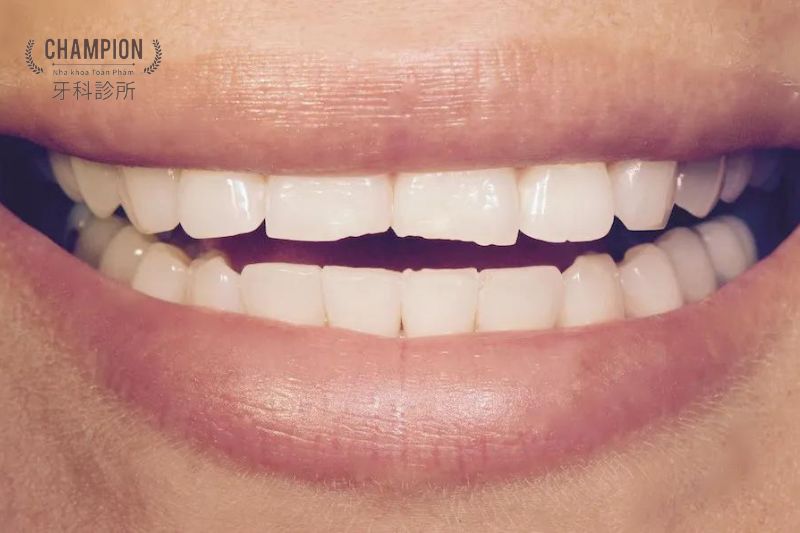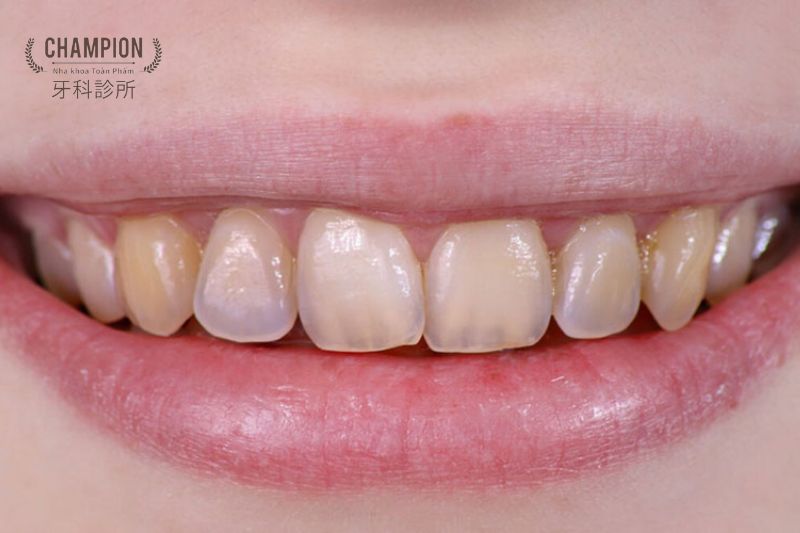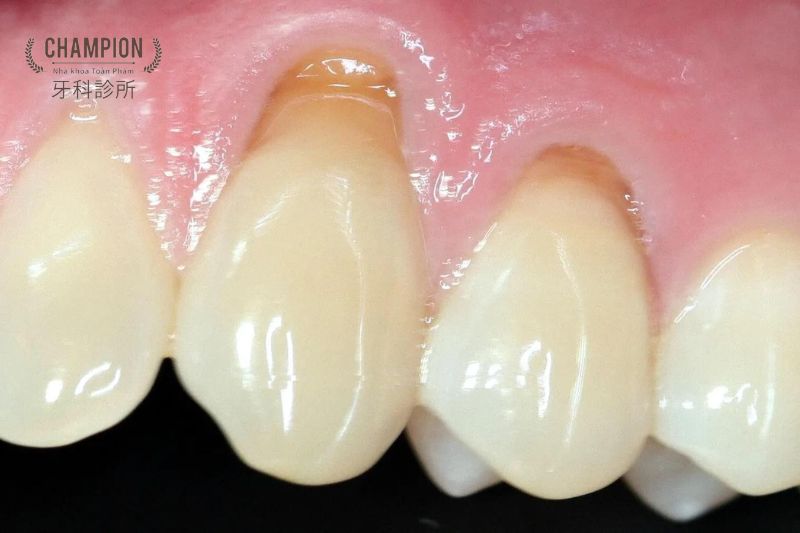Tooth erosion is a very common issue that significantly affects oral health. It is not only a cosmetic concern but also a general health concern. The following article from Champion Dentistry will analyze the phenomenon of tooth erosion, its causes, signs, and treatment.
What is tooth erosion?
Tooth erosion is a serious condition in dentistry where the protective enamel layer of the teeth is lost due to abrasive factors. This often happens rapidly, especially in younger individuals. Once the enamel is lost, there is no natural way to replace it.

Common groups of tooth erosion
Tooth erosion can be categorized into 4 groups based on the causes of the condition, each group having distinct characteristics and consequences.
Physiological tooth erosion
Physiological tooth erosion occurs naturally due to friction between teeth during daily activities. The main characteristic of physiological tooth erosion is the sequential loss of enamel starting from the chewing surface, followed by the lower and upper tooth ridges. When enamel is eroded, the underlying dentin is exposed and can also erode quickly, creating concave lesions resembling cupping.
Pathological tooth erosion
Pathological tooth erosion results from friction between teeth and external factors. Overbrushing and the habit of biting hard objects are the primary causes. Pathological tooth erosion often follows physiological tooth erosion and can lead to severe damage.
Chemical tooth erosion
Chemical tooth erosion occurs when the enamel loses structure due to exposure to acidic substances, not necessarily caused by bacteria. These substances can include highly acidic fruit juices or even stomach acid. Chemical tooth erosion typically displays widespread, less localized erosion and can have rapid consequences.
Abrasion of the tooth neck
Abrasion of the tooth neck is the condition where the enamel structure is lost at the neck of the tooth due to bending forces, often stemming from incorrect brushing habits over an extended period. This results in erosion in the neck region, affecting the strength and durability of the tooth.

Main Causes of Tooth Erosion
Tooth erosion is a common issue that can arise from various causes, specifically:
- Incorrect brushing: Brushing too hard, using a stiff toothbrush, or using toothpaste with abrasive substances can lead to gradual erosion of tooth enamel over time.
- Dietary habits: Regular consumption of acidic foods and beverages such as soda, citrus fruits, coffee, wine, etc., can contribute to tooth enamel erosion.
- Gastroesophageal reflux: Acid reflux from the stomach into the esophagus and mouth can result in tooth enamel erosion.
- Dysfunction of the temporomandibular joint: Teeth grinding or clenching can lead to enamel erosion.
- Genetic factors: Some individuals may have weaker tooth enamel, making them more prone to tooth erosion.
>> See more: Salivary Gland Calcification and What You Might Not Know
Identifying Signs of Tooth Erosion
To easily identify tooth erosion, one can observe the following symptoms:
- Tooth sensitivity: Teeth become sensitive to hot, cold, sweet, or acidic foods and beverages.
- Toothache: Teeth may experience pain or discomfort during chewing or biting.
- Erosion of tooth enamel: The tooth surface may show signs of erosion, such as cracks, chips, or indentations.
- Discoloration of teeth: Teeth may become dark yellow or discolored due to the loss of enamel, revealing the inner dentin layer.
Serious Consequences of Tooth Erosion
Tooth erosion not only poses cosmetic concerns but also has serious consequences, impacting overall oral health and the entire gum and jawbone system.
- Discoloration of teeth: Tooth erosion results in the loss of the protective enamel layer, causing teeth to become discolored. This can lead to aesthetic concerns and a loss of confidence in social interactions.
- Increased tooth sensitivity: Eroded teeth become more sensitive, causing discomfort when exposed to hot or cold foods. This makes eating challenging and leads to daily discomfort.
- Reduced chewing ability: Eroded teeth reduce the effectiveness of chewing and grinding food, placing additional strain on the chewing muscles. This can lead to fatigue, stress on the jaw joint, and a decrease in the quality of daily life.
- Cavities and pulp inflammation: Loss of enamel exposes the inner dentin layer, making the teeth more susceptible to cavities. If left untreated, cavities can progress to pulp inflammation, causing pain and discomfort.

Effective Treatments for Tooth Erosion
Facing tooth erosion, treatment aims not only to restore tooth enamel but also to prevent further erosion. Common treatment options include:
- Adjusting oral care habits: Correcting brushing techniques can help prevent erosion.
- Limiting acidic foods: Reducing the consumption of acidic foods and beverages helps minimize the negative impact on tooth enamel.
- Fluoride therapy: Dentists may apply fluoride directly to the teeth or provide fluoride trays for at-home use. Fluoride helps protect tooth enamel, prevent cavities, and enhance resistance to erosion.
- Dental fillings: Filling materials such as amalgam or composite can fill cavities, restore tooth surfaces, and prevent ongoing erosion. This is a common and cost-effective restoration method.
- Dental veneers: Dental veneers can be placed on eroded, cracked, or chipped teeth. This not only restores the teeth but also prevents further erosion, improving aesthetics.
- Dental crowns: Recommended for severe and deep erosion cases, crowns made of materials like porcelain or gold cover the entire tooth after removing the thin enamel layer and deep erosions. This prevents cavities and ongoing enamel erosion.
Conclusion
Understanding the causes, symptoms, and treatment of tooth erosion helps individuals maintain healthy and beautiful teeth. Proper oral care and maintaining a healthy diet are key to preventing tooth erosion and protecting long-term oral health. Regular check-ups at Champion Dentistry can help monitor oral health and receive attentive care from our dedicated professionals!
Vietnamese & English: (028) 5411-2295
中文: (028) 5411-2297 172 Nguyen Luong Bang, Tan Phu Ward, District 7, Ho Chi Minh City.
Fanpage: Champion Dental Clinic 牙科診所
Zalo: Champion Dental Clinic
Youtube: Champion Dental Clinic 牙科診所
 Champion Dental Clinic
Champion Dental Clinic



